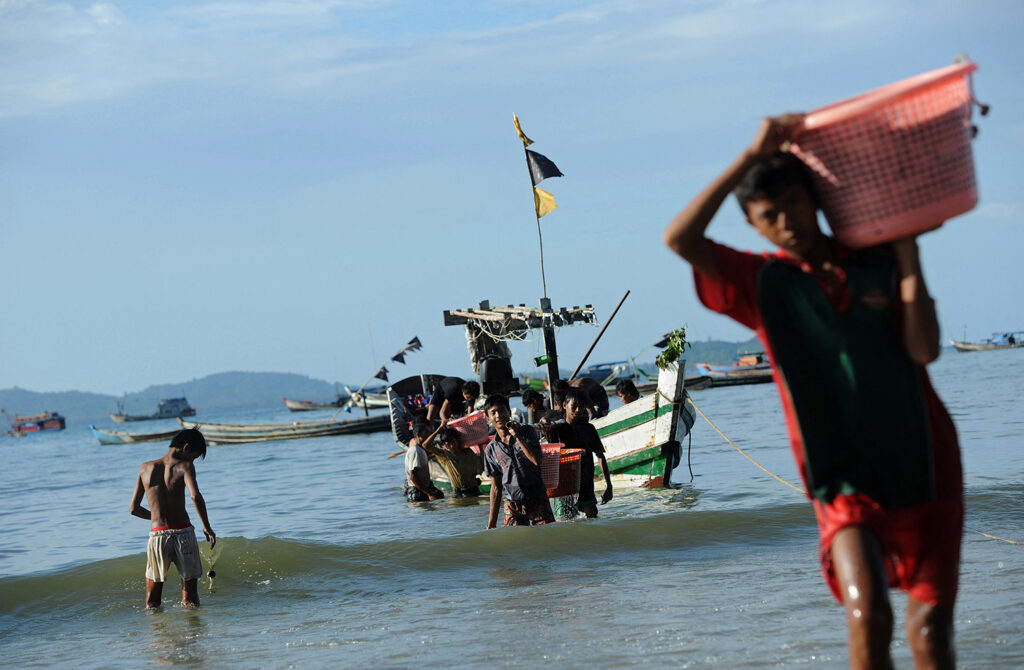The post-coup economic crisis has rattled the fishery sector, pushing many fishermen to pack up their poles and seek risky work abroad, while businesses shutter or fish for new buyers – but few are taking the bait.
By FRONTIER
Ko Myat Thar packs his bags and says his goodbyes to family and friends in Myar Wa village, in southern Rakhine State. After 15 years working at sea, he is joining hundreds of others seeking new shores abroad as the local fishing industry collapses.
His village is in Thandwe Township, one of Rakhine’s southernmost constituencies, which includes stretches of palm-lined beaches and islands once filled with tourists and fishermen.
Myat Thar says he has little choice but to look for a job in Thailand after his longtime boss shut down his fishing business, no longer able to cope with soaring prices for basic commodities like fuel as the economy crumbles.
“I know there are many risks working in fishing in Thailand. But that’s all I can do as someone with my long experience fishing at sea. I got a job there through a broker,” the 35-year-old fisherman told Frontier, referring to the human trafficking and exploitative working conditions that have made the Thai fishing industry infamous.
“Lots of people from our village and nearby villages have left to work on boats in other countries because so many local fishing businesses have stopped since the coup,” he said.
When the military seized power in February 2021, it sparked a political – and economic – crisis that saw prices of basic commodities soar as the value of the kyat plummeted.
While the economic freefall has stabilised, the overall situation remains dire. Like many other trades, the fishery sector has been hit hard by surging costs of fuel and other important overheads, and is even more vulnerable to disruptions due to the short shelf life of its product.
Commodity prices bite
The small business employing Myat Thar used to provide jobs to over 30 people, including the women who cleaned and packed the fish onshore. Not anymore.
“When business was good, there was work for 30 to 40 people. But then demand for fish fell badly with the pandemic. We all hoped the end of COVID-19 would bring back better days, but the coup hit our business even worse,” he said.
“To get big fish good enough for export, the boats have to stay out at sea for months. Fuel prices are higher than ever, really hitting profits. Most boat owners can’t handle this any longer.”
Initially Myat Thar’s boss tried to reduce fuel costs by cutting offshore fishing –when boats stay far out at sea for long periods – and just focusing on inshore fishing, conducted closer to the coast for much shorter periods of time. He then moved to downsize the workforce, but this year decided to close the business entirely.
U Aung Zan* had been working in marine fishing for nearly four decades based in Gyeiktaw ward in Ngapali town, well-known for the beach of the same name, but was also forced to shut his business last year because of soaring fuel prices.
“Under the junta’s administration, costs have tripled. Fuel prices had a huge impact. In the past filling a 52-gallon diesel tank cost around K200,000 [US$95] but now it’s nearly K600,000. In the meantime, fish prices haven’t gone up much. I have no choice but to shut down,” he told Frontier.
U Than Htay, secretary of the Gyeiktaw Fisheries Association, said that since the coup, most businesses in the ward are only doing inshore fishing. They are catching small fish like nganitu, a type of anchovy mostly used to make fish sauce, to supply the local market rather than for export.
And fuel isn’t the only commodity surging in price.
Inland fish farmers are also struggling with high costs of food. The raw materials for fish food are mostly imported and shortages have driven prices through the roof. As a result, farmers are turning to cheap alternatives, such as animal carcasses, or vegetation ground up with food by-products and waste from other fishery products.
But Ko Tainyan Phyo, a fish farmer in Yangon Region’s Twante Township, said buying waste from wholesalers is becoming pricey and complicated due to high demand.
Fish wholesalers now require up front payments of at least K5 million for six months of supply. “Small fish farms can’t manage that, and some have to stop farming. If we used pure fish food to feed the fish, we would go bankrupt,” Tainyan Phyo said.
Even the by-products of rice and oil milling have tripled in price, with one bag of rice bran now costing K24,000.
Tainyan Phyo says he has to spend K100,000 each day just on food for his 20 ponds, while it takes from three months to over one year for the fish to grow enough to be sold. He said that before the coup, fish farm owners needed to make an initial investment of about K2.5 million per acre, but now they need up to K8 million.
“Some of them can’t do farming anymore at all,” he said.
The post-coup crisis is undermining the industry in other ways, with frequent power cuts, erratic fiscal policies and a raging civil war all dampening profits. The need to keep fish products cold and fresh poses unique challenges that have been exacerbated since the coup.

“Cold rooms for fishery products need electricity 24/7. When the power goes off, we have to use generators. Transportation charges have at least doubled. If trucks have to stop because of instability while we are transporting our products across the borders then we risk losing all our money,” said U Min Zaw*, a senior member of Myanmar Fisheries Products Processors and Exporters Association.
According to the exporters’ association, China and Thailand are the main destinations, and both border areas have seen a major increase in fighting since the coup.
Fishpond owners are meanwhile struggling to buy the flake ice they urgently need to preserve their fish, since soaring demand is driving up costs of a scarce resource.
“Now we find ourselves competing just to buy flake ice. Those prices have jumped too and we can’t source it when we want,” Tainyan Phyo said.
The Central Bank has also ordered all exporters to immediately convert 65 percent of their income from dollars to kyat, at the bank’s official rate, which is far below the market rate.
“Running a fishery business is like walking a tight-rope at the moment. There are many obstacles to exporters,” Min Zaw said.
A sinking ship
Myanmar’s exports of fish and seafood products fell from $850 million in 2019-20 to $745 million in 2022-2023, according to the junta’s Ministry of Commerce.
Min Zaw said exports are expected to further decline in the current fiscal year because fish farm production is decreasing as a consequence of high production costs.
Signs of this are already apparent. The Ministry of Commerce data indicates that fish product exports in the first two months of this fiscal year logged in at $72.1 million, down from $90.4 million in the same period last year.
In 2020, the Department of Fisheries said there were 3.5 million full-time workers in Myanmar’s fishing industry, including freshwater fisheries, making it the second biggest employing sector in the country after agriculture.
There are no statistics available on how many jobs have been lost in the fishing sector since the coup, but experts say the number could be huge. Than Htay, for example, says that in Gyeiktaw ward, which consists of 3,000 households, at least 400 people have lost their jobs.
“That is just the number for our ward, and Ngapali has five wards. I think thousands of workers in our town have already lost their jobs,” he said.
According to the Gyeiktaw Fisheries Association, more than 10pc of businesses in the ward have closed permanently since the coup, while another 70pc have downsized. Only 15pc can still maintain offshore fishing.
With the cost of living going up even as many businesses trim down or go under, many workers are struggling to make ends meet. U Paing Soe*, a fish farm owner in Ayeyarwady Region’s Maubin Township, said the average monthly wage is K150,000 but workers are now asking for K200,000.
“I totally understand their difficulties. With such high living costs, wages are no longer enough. But my business is also facing a lot of difficulties, so I can’t meet their requests completely,” he said.
‘For Sale’ signs are now common on social media groups used by fish farmers. Ma Hnin Moe, a broker in Twante, told Frontier that she has many clients hoping to sell their ponds, even offering prices below the market rate. She’s had nibbles, but no bites.
“I have 74 acres on my hands registered for sale through my agency. The average market price is K15 million per acre. Even though we are asking for offers under that amount, there are no buyers, just a few inquiries. There are dozens of brokers like me in my town,” she said.
A Myanmar Fisheries Federation source, who asked not to be named, said there could soon be shortages of fish for domestic consumers.
“Fish prices have doubled this year. One viss [1.63kg] of fish is now K4,000. It was around K2,000 before. It’s another sign of inflation but the higher prices still don’t cover the cost of fish production. The government needs to step in and help the fish farming industry,” he said.
The regime’s Ministry of Agriculture, Livestock and Irrigation says it’s issuing loans for both marine fishing and fish farming businesses, and the Rakhine fisheries department announced in March that it would lend more than K1 billion to businesses at an interest rate of 0.5pc.
Business owners in Rakhine read in state media they could apply for loans through committees formed by village administrators. However, Frontier was unable to find any business that had received one. Than Htay said there was no such committee in his ward, and he had not heard of a business actually receiving a government loan either.
“No one is interested in taking loans because they are tiny compared to what we invested and now the crisis is worse. Who wants to go through the military’s red tape just for this amount of money?” asked Paing Soe, the fishpond owner in Maubin.
For Than Htay, the collapse of the industry is about more than just the lost income – it’s a lost way of life.
“We grow up with the sea from the day we are born,” he said. “Fishing on the boats has always been the only job around. Now there are many unemployed here, so they have to leave their villages and take the risk of working illegally in other countries.”
*indicates a pseudonym for security reasons







